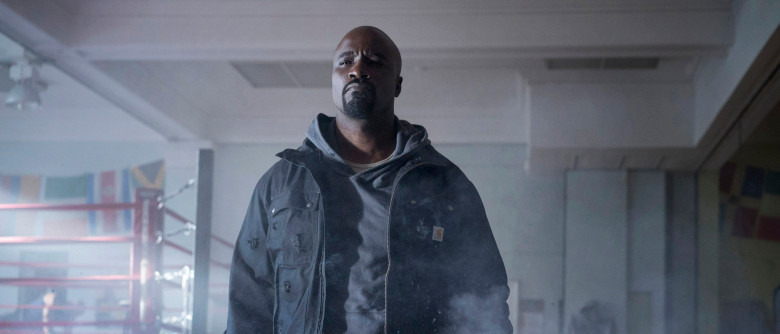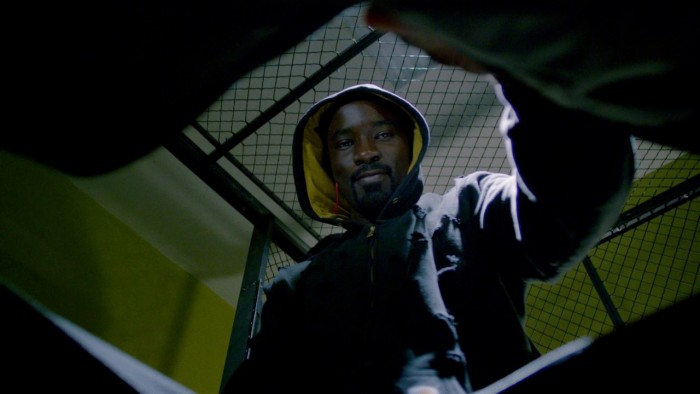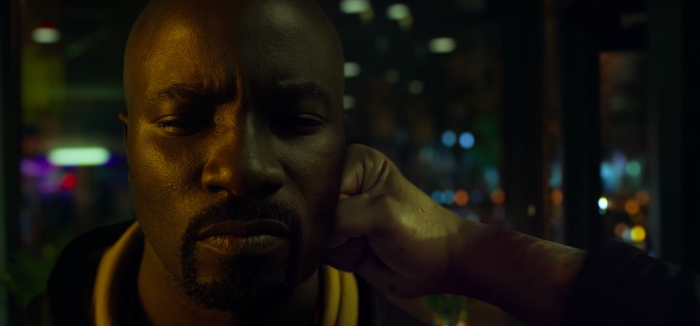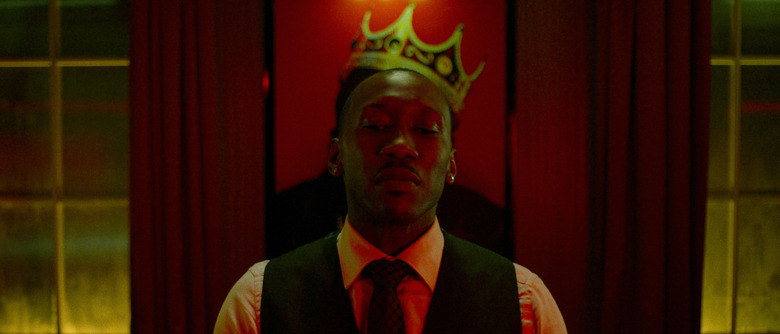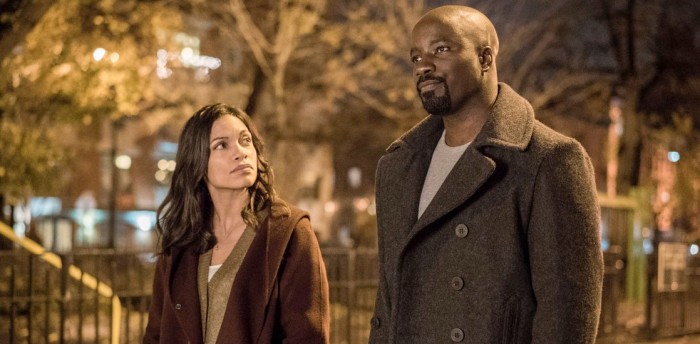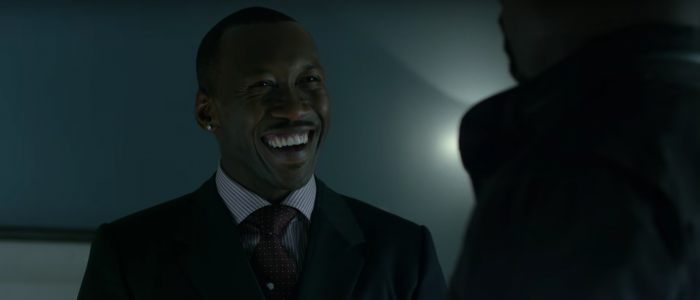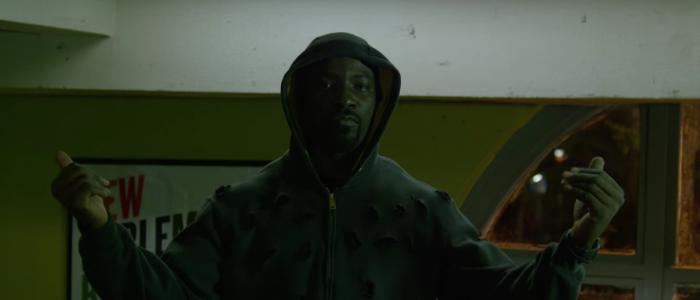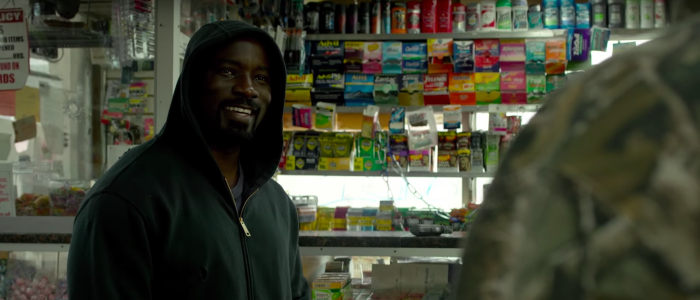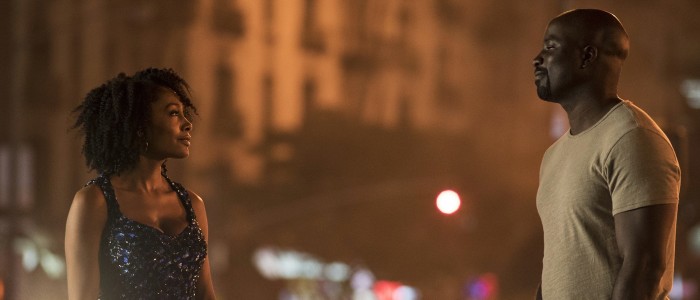'Luke Cage' Spoiler Review: Marvel's Latest Netflix Series Is An Entertaining (And Sloppy) Mixed Bag
The short version: I mostly enjoyed Marvel's new Luke Cage series very much.
But chances are strong that you've already binge-watched Marvel's latest Netflix series, the follow-up to Daredevil and Jessica Jones and you don't want the short version. You may be looking for a deeper dive into spoiler territory, a place to pick apart what works about this show and what doesn't. So let's take a closer look.
Let's Just Dwell on Mike Colter For a Moment
Every single Marvel project so far has lived or died on the strength of its lead. On the big screen, the Marvel Cinematic Universe can weather the occasional bad movie because just about everyone likes Chris Hemsworth's Thor, even if his movies don't always impress. On the small screen, Charlie Cox and Krysten Ritter go a long way toward helping smooth over the rough edges of Daredevil and Jessica Jones. And now, Mike Colter does a fine job of continuing that tradition.
As the title character in Luke Cage, Colter delivers just about everything you'd want from a superhero actor. He's the kind of absurd physical specimen who looks like he stepped right out of a comic book panel – buff and handsome and seemingly gifted with the exact combination of genes that make him look right at home punching his way through a brick wall. But Colter isn't just a superhero illustration come to life. He's also the kind of guy who steps into frame and simply commands the screen with an innate charisma. From the moment you lay eyes on him, you're on his side. It's the kind of thing you can't learn. Either you have it or you don't and man-oh-man, does Mike Colter have it.
While Colter is right at home delivering exactly what Luke Cage asks of him, it is rather odd that he seems a few degrees removed from the same guy we saw in Jessica Jones last year. He's more serious-minded and more prone to anger than the charming bartender whose surprising relationship with a super-powered private investigator made for one of the best MCU stories yet. This could be considered fallout from the events of that series, which saw Luke forced to flee Hell's Kitchen (and take refuge, uh, 30 minutes away in Harlem?), but the show lets Colter down on this front. For a franchise where so much of the fun is derived from interconnectedness, Luke Cage only pays lip service to Jessica Jones and the rest of this world. We'll dwell more on this in a moment.
But yeah, Mike Colter is a star.
The Pros and Cons of a Bulletproof Man
Luke Cage is at its best when it's treating its lead character like a working-class Superman. Hell, in many ways and for certain stretches, Luke Cage is a better Superman story than anything we've seen from the big screen in some time. As played by Colter, Luke is a smart, curious, and sweet soul housed in a body that can take down a wall with a single punch. Although he's reluctant to take credit (or cash) for his heroic deeds, he's the kind of man who simply cannot turn away from a crime. Despite a checkered past, that's the most endearing thing about Mr. Cage – he's a pure "white hat" hero, a guy who is simply out to do the right thing at all times and finds himself dragged through the mud for his troubles. Next to Daredevil and Jessica Jones, who both struggle with their roles as crime fighters on a second-to-second basis, the pure heroics of Luke are refreshing.
However, Cage also has the same speed bumps as a character like Superman. When bullets literally bounce off your hero, typical physical confrontations lose some of their bite. It's a ton of fun to watch Luke walk into a building full of baddies, absorb tons of punishment without a single bruise, and leave a trail of battered henchmen in his wake. Eventually, though, you have to put him against an actual threat and this is where the series stumbles a bit.
One the show's best decisions is to out Luke Cage early on, with our hero pulling a Tony Stark and saying his name on live television at the end of episode four. There's no mask for Luke and no secret identities – for the bulk of the 13 episodes, he's living and working in the public eye. This turn ultimately leads to my favorite episode of the season (more on that shortly), but it also drags us into a tedious "everyone sets out to frame Luke Cage" plot. From the outset, it's a decision that makes sense. If you can't damage the man, then the villains have to damage his reputation! Ruin him in the eyes of everyone around him! But this gets repetitive quickly and it asks us to start believing that characters who were firmly established as not being idiots would act like idiots. The show pulls out of this nosedive in its final stretch, but too much of Luke Cage is watching characters fail to communicate.
And then the show shoots Luke with two "Judas bullets," which are powerful enough to pierce his skin. While it's unsettling to watch this unstoppable guy struggle against his own personal kryptonite, the show takes him out of commission for far too long. Any Luke Cage episode that benches Mike Colter is a weaker episode of the series.
The Ever-Expanding MCU
The "Judas bullet" is one of several direct connections between Luke Cage and the Marvel Cinematic Universe. Developed by Hammer Tech (the company run by Sam Rockwell's character in Iron Man 2), the bullet uses alien technology recovered after the Avengers' battle with the Chitauri, a fact that is casually rattled off by the series' more grounded villains. It's one of several tossed-off references to the films, as the series also features street vendors selling bootleg DVDs of superheroes in action and so on (although no one pauses to remember the time when the Hulk "broke Harlem"). What's weird is how the series refuses to address most of the big screen characters by name, referring to magic hammers and big green monsters rather than drop an actual name. This could be a weird side effect of the tensions between Marvel's film and television divisions, but the results are just plain weird to see on screen. Does Luke Cage really believe that somebody would say "flag guy" instead of Captain America? This makes a line of dialogue where Luke is called "Harlem's Captain America" all the more jarring. Are we watching a story or a contractual negotiation over how many times this show is allowed to mention a character's name?
The connections to the other Netflix shows are also hit or miss. It's fun to hear to the new villains refer to failures of Walter Fisk, and Rosario Dawson's Claire Temple saying that she knows a good lawyer provides a chuckle, but other elements are handled awkwardly. For example, Dawson is given the task of dropping some stilted Daredevil season 2 exposition, probably because the threat she's referencing will be what drags the Defenders together for their own series. However, the real weak point here is how the show generally avoids much of Jessica Jones, both the character and the show that bears her name. Much of Luke Cage feels like a clean reboot of the character and that genuinely romantic (and ultimately stormy) relationship that made us fall in love with Mike Colter in the first place is swept under the rug without a moment's hesitation. I didn't need 13 episodes of Luke sulking around Harlem over a girl, but more than a passing reference or two would have been nice.
A Long List of Villains
While the big screen adventures set in the MCU have often struggled to create compelling antagonists for the heroes to outwit and punch in the face, Marvel's Netflix series have a habit of delivering villains worthy of their heroes. Vincent D'Onofrio's Kingpin is one of the best comic book villains of all time, an overgrown child with a mean streak and a talent for running a criminal empire. David Tennant's Kilgrave was effective in a very different way, giving Jessica Jones a foe who felt straight out of a horror movie. And for a little while, it feels like Luke Cage will follow suit with Cornell 'Cottonmouth' Stokes, played by the ferocious Mahershala Ali.
And then the show kills him off and moves on.
Granted, Cottonmouth wasn't as commanding as Kingpin or as frightening as Kilgrave, but he's certainly a step above your usual television criminal. It doesn't help that his death comes soon after his back story is fully revealed. Once his human side has been exposed, Cottonmouth is beaten to death by his cousin, Mariah (Alfre Woodard) in the kind of twist that elicits an "Oh" rather than a "Holy shit!" Unfortunately, the show never manages to fill the void created by his death. Mariah is fine, but if she wasn't played by an actress as skilled and watchable as Woodard, she would be cardboard. And while Theo Rossi is a perfectly fine actor, Hernan "Shades" Alvarez is never as threatening or menacing as he needs to be to make up for Cottonmouth's loss.
Of course, the series does immediately introduce a new Big Bad in Willis "Diamondback" Stryker, but a vengeful sibling with a habit of quoting the Bible in every dramatic encounter is about as tired as villains can get. Erik LaRay Harvey chews into every line, but he's introduced far too late to have any impact and he's never as threatening or as sympathetic as Cottonmouth. He's the one-note bad guy this show was seemingly sidestepping in the first half of the season.
A Strong Batch of Allies
When are we going to acknowledge that Rosario Dawson's Claire Temple is the real hero of these shows? She's saved Daredevil's butt on more than a few occasions. She stepped up in a big way when Jessica Jones needed a way out of a jam. And now, she finds herself in Harlem at the exact right time to become a much-needed ally for Luke Cage. I'm still not sure how much I can tell you about Ms. Temple as a character, but I can tell you that Dawson is a ton of fun and she's making this whole "act as a foil for an increasingly outrageous number of superheroes" thing look easy enough.
The series also introduces us to Misty Knight, a no-brainer of a character for any Luke Cage adaptation. While the Marvel fan in me is disappointed by how much she's been toned down from her comic book counterpart (what, no bionic arm?), Simone Missick goes a long way toward helping me accept this far more ordinary take on the character. Even when the series demands that she be an idiot to further the plot, Missick lends Detective Knight the kind of intelligence and wit that make her indispensable to a superhero who can walk into a hail of bullets and emerge unscathed. As far as Marvel/Netflix sidekicks go, she's more Trish Walker than she is Foggy Nelson.
The Music
I have written time and time again about the lack of recognizable musical themes in the Marvel cinematic universe, which is a problem when you have a cast of characters who demand an instantly hummable melody. Luke Cage doesn't completely fix this problem (its main title theme goes in one ear and out the other), but it takes a few giant steps forward. The soundtrack has personality, using funk, jazz, and hip-hop to inject life into countless scenes. Even when the actual look of the show is boilerplate Marvel television (generic fight scenes in dark hallways), the music gives it an edge. Luke Cage often sounds like a classic blaxploitation movie, an appropriate touch considering that the original comic book character was Marvel's attempt to capitalize on that movement.
Also wonderful is the use of live music in the sequences set in Harlem's Paradise. I'd need both hands to count the number of times I pressed pause so I could look up (and purchase) the song I was seeing performed. I haven't been able to stop listening to "Long Live the Chief" for a few days now.
A Strong Start...
For its first few episodes, I thought for sure that Luke Cage was going to avoid the speed bumps that have tripped up previous Marvel shows. Although the show is slow to introduce a master plan of any kind for the villains, I was enjoying the hang-out vibe. I liked watching Luke and Misty meet-cute, and dug the conversations in Pop's Barbershop. I liked how each episode generally established a piece of necessary business and resolved it by the time the credits rolled, the kind of storytelling that makes television binge-worthy in the first place (and which has been largely ignored by many streaming series). Despite an all-time awful fake wig, "Step in the Arena" is a rock-solid origin story that arrives at just the right point in the show.
But it's the fifth episode, "Just to Get a Rep," that really won me over and showcased what Luke Cage could be. It's a story that feels like it was torn straight out of a classic Marvel comic: Cottonmouth's henchmen hit Harlem with a crime spree, forcing Luke Cage into action on the day of a good friend's funeral. It's a combination of the mundane and the fantastic, with Luke wandering through subplots, smashing bad guys to bits, and trying (and failing) to not get a bullet hole or two in his new suit. This was the point where I realized I would happily watch a Luke Cage series that was just him solving a new crime every hour.
A Sag in the Middle...
Unfortunately, serialization soon comes back with a vengeance and any chance of one-and-done episodes vanish in a series of tedious cliffhangers. Like Daredevil and Jessica Jones before it, Luke Cage sags in the middle, as if the writers had a beginning and an end but had no idea how to connect the two. Instead, this is the point where everyone essentially runs in circles for five hours. This is where Luke gets shot and stays injured for far too long. This is where the supporting cast has to circle the plot instead of engage with it because it's not time to reach the ending. The problem here isn't an issue of uneven or bad storylines – it's an issue of no storylines, with every active plot turning into a glacial death march toward the climax.
This is the kind of issue that you'd think Marvel would actively work to fix since it plagues all of their shows. You'd think showrunners would consider asking for shorter seasons to better accommodate how much story they have. It worked for Stranger Things! At the very least, you'd hope that the serialization would be compressed into a handful of episodes and the other hours would be allowed to focus on contained, one-off plots. But nah. We are four seasons into this corner of the MCU and this problem has gone from irritating to unforgivable.
... And a Weird Sprint to the Finish
Luke Cage does recover in the home stretch. And then it gets weird. For a show that has a definite desire to remain as grounded as possible for its first eight hours or so, the series gets genuinely funky in its final hours as it breaks out all kinds of mad science and weirdo technology. It's jarring at first to see Diamondback show up to his final fight with Luke wearing a suit of armor that looks more like something from Arrow or The Flash than a Marvel Netflix series, but this is something these shows need to do more often. The very nature of Luke Cage's world demands a certain level of realism, of groundedness, but his world only becomes more entertaining when a guy wearing a super-suit struts into the mix. I've made peace with the fact that these shows are going to be more stripped-down and po-faced than the Marvel movies, but that doesn't mean they shouldn't be allowed to get bizarre.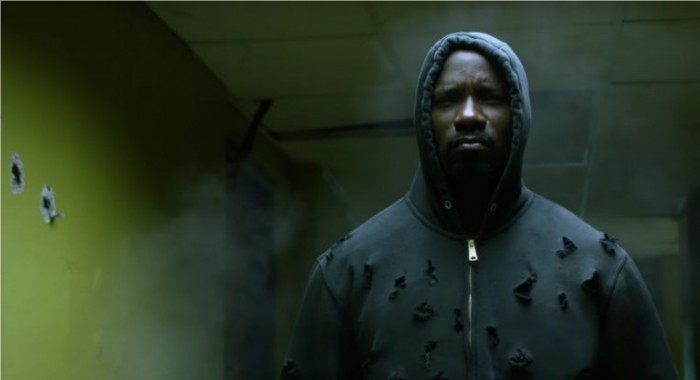
Let's Get Political For a Second
I'm in no position to write too eloquently on the racial politics on display in Luke Cage. I don't have the appropriate worldview or the kinds of life experience necessary to make dramatic sweeping statements about what this series wants to address in between the superhero brawls.
However, I can say this much: I'm so glad this show chose to not tone itself down on this front. In the modern landscape, a show where the hero is a bulletproof black man wearing a hoodie is a loaded image by default and Luke Cage leans into it. The final episodes in particular are fascinating – with Luke a wrongfully accused and wanted man, his community rises up around him, with some men even wearing clothing filled with holes in solidarity with their hero. Luke finds himself elevated to a folk hero, the subject of a new song from Method Man (!), and the police characters, who have been portrayed in a genuinely sympathetic light, find themselves at odds with the community. Luke Cage could have easily side-stepped all of this, but it doesn't. This is a superhero show that is aware of the Black Lives Matter movement and the daily headlines concerning the deaths of black people across the United States. This is going to make some viewers uncomfortable and I say this: good. Because the ideas at work in the margins of this show should make you uncomfortable.
Luke Cage is a mainstream superhero television show where most of the cast is black and many key characters are black women. This shouldn't feel out of the ordinary. This shouldn't feel special and unique. But it does. And that alone should make you reconsider just about everything you've watched recently.

